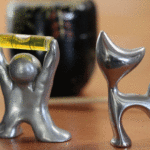What Causes Coincidences?
I’m interested in coincidences, especially those related to health, such as feeling a pain and then discovering that at the same time, a close friend was injured in that part of the body. Is there any scientific explanation for why this occurs?
Andrew Weil, M.D. | March 29, 2022

Coincidence is a fascinating topic, and one that has fostered an emerging field of scientific research. Bernard D. Beitman, M.D., is a leader in the field; he has published several academic papers on the topic and is the author of the 2016 book Connecting with Coincidence: The New Science for Using Synchronicity and Serendipity in Your Life. In 2020 Dr. Beitman founded The Coincidence Project, and he currently publishes both a podcast and a Psychology Today blog named Connecting with Coincidence. Dr. Beitman is a visiting professor at the University of Virginia and former chair of the Department of Psychiatry at the University of Missouri-Columbia.
Dr. Beitman is particularly interested in the kind of coincidence you describe – feeling the distress of a loved one at a distance, which he calls “simulpathity.” He has had this experience himself. He describes inexplicably choking at the same time – he learned later – his dying father was choking 2,000 miles away.
He credits events we regard as coincidences as perceptions that emerge from “swirls of information in our minds juxtaposed with swirls of events in our surroundings…The match is often surprising because it seems improbable.” But he proposes that coincidence is more than “the unlikely juxtaposition of similar events.” He contends that “the…events must also be meaningfully connected, and the meaning is personal and intricately linked to the person involved.”
In his book, Dr. Beitman relates story after story of amazing coincidences – the brother who inexplicably drove to the place his sister sat with a gun in her hand about to commit suicide. The brother had no idea why he got into his car; he didn’t know where he was driving, nor why he was going there or what he was supposed to do when he arrived. Simulpathity coupled with an uncanny knowledge of where to go helped to save his sister from taking her own life.
Dr. Beitman acknowledges that the mathematically inclined would say coincidences like this are examples of random chance at work, a view reflecting a fixed belief in the laws of probability. But he maintains that there are too many similar coincidences to chalk up to random chance. “These coincidences suggest we live in a matrix of unbounded links to one another, especially those we love, especially those with whom intense emotion has forged a bond beyond our current understanding,” he writes.
Dr. Beitman’s research has revealed that at least a third of the general population frequently notices weird coincidences. “Twins, family members, friends, therapists and patients are much more connected and entangled with one another than we have previously recognized,” he writes. “Some people will claim that these stories are romantic fabrications driven by a wish for ethereal energies, but the sheer volume of similar, heartfelt, amazing experiences argues otherwise.”
His theory of coincidence focuses on simulpathity and a kind of “human GPS.” “Simulpathity tells us we can connect with the experience of others at a distance without knowing how we do it,” Dr. Beitman writes, while human GPS tells us that “we can find our way to people, things and ideas without knowing how.”
If you’re curious about coincidences you have personally experienced, this book, along with Dr. Beitman’s other writings and podcast episodes can help you better appreciate them and their potential to enrich our lives. There are also many other recent academic articles that examine the concepts of coincidence and causality that you may find interesting.
Andrew Weil, M.D.
Source:
Bernard D. Beitman, M.D., “Connecting with Coincidence: The New Science for Using Synchronicity and Serendipity in Your Life.” Health Communications, Inc. March 2016
Originally published April 2016, Updated March 2022














